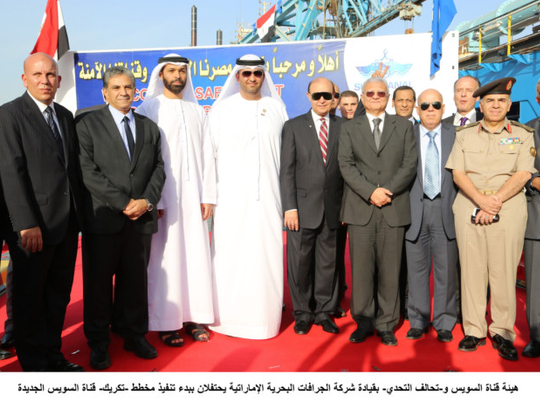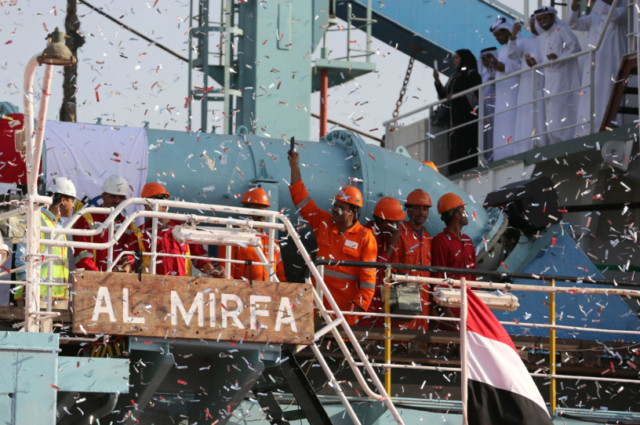
Dubai: Development projects worth $10 billion (Dh36.7 billion), funded by the UAE, are currently under construction in Egypt — benefiting some eight million Egyptians and creating 600,000 new jobs.
The projects, which span construction of housing units, healthcare centres, schools, grain silos and wastewater treatment facilities, among others, are already under way and set for completion in 2015.
The UAE is backing Egypt with both financial and operational support across a wide range of social and economic development projects, and through technical assistance, to help develop the country’s economic development plan.
The projects are part of an agreement signed between the UAE and Egypt in August 2013, with the aim of developing various sectors and service facilities across the country to help improve people’s living standards.
They include the implementation of a $50 million housing project that involves the construction of 50,016 new housing units for families across Egypt. It involves the setting up of residential compounds, equipped with all facilities and services, for 50,000 families with limited incomes.
Egyptian Prime Minister Ebrahim Mahlab expressed profound gratitude to the UAE, led by President His Highness Shaikh Khalifa Bin Zayed Al Nahyan, for standing by his country at this critical time in the history of the region.
“UAE-Egypt ties are deeply rooted in history. Historical events and honourable stances show how these fraternal bonds were rock solid,” Mahlab said while speaking during a panel discussion for the Emirati-Egyptian media, organised recently by the Dubai Press Club in Cairo. Mahlab added that Egypt and the UAE have set a strong model for countries that share a common destiny.
Dr Sultan Bin Ahmad Sultan Al Jaber , Minister of State, was assigned by the UAE to supervise the implementation of the UAE-funded development projects in Egypt, where a permanent office in Cairo was set up to follow up on these projects.
Dr Al Jaber, who is also the Chairman of the Coordination Office of the UAE- Funded Development Projects in Egypt, hailed UAE-Egypt ties as deeply rooted and based on transparency, clarity, concord, and common destiny and goals.
Speaking about UAE projects in Egypt, Al Jaber said that the UAE leadership’s directives were quite clear from the outset that these projects were designed and implemented to improve the lives of ordinary Egyptian people.
Asked about investment opportunities available to Emirati investors, Dr Al Jaber said there were numerous promising investment options for UAE investors within the ambitious Egyptian economic development plan. He also called on Emirati investors to enter into joint investment partnerships with their Egyptian counterparts to positively contribute to improving economic growth in Egypt in the medium to long term.
The construction of 100 schools in 18 governorates is also among projects financed by the UAE. The project will provide 1,668 classrooms that can accommodate more than 67,000 pupils in remote and deprived areas. It will help in Egypt’s efforts to eradicate illiteracy and reduce dropout rates and create more than 8,000 temporary jobs and 3,200 permanent ones.
Among the projects is the construction of 78 healthcare units and medical clinics for more than 780,000 citizens that will help reduce the plight of needy Egyptian citizens in remote areas and those deprived of health facilities. The project will offer more than 5,000 jobs in the construction industry and 1,000 permanent jobs.
The UAE will also fund a project to renovate and build 25 wheat silos with a total capacity of 1.5 million tonnes, thereby increasing Egypt’s wheat storage capacity by 25 per cent. This project will reduce Egypt’s reliance on wheat imported from abroad and help create 15,000 new jobs.
Four new bridges will be set up across four governorates to help reduce traffic congestion and consequently reduce deaths resulting from car accidents. Also 42 railroad slides in six governorates will be rehabilitated, thereby reducing railway accidents and train crashes in the country.
Sewerage infrastructure
The projects also include providing 600 buses for public transport to lighten pressure on traffic movement on roads and ensure smooth traffic flow. The new fleet of buses will serve 600,000 passengers a day and offer 2,400 new jobs.
The UAE will finance development of four vaccination lines to provide various vaccines to children and patients as well as to provide enough insulin to diabetic patients.
A total of 151 villages will witness the development of sewerage infrastructure, thus improving the environment and public health of 1.7 million Egyptians. The project will create more than 23,000 jobs in construction.
A project to provide solar electricity to 62,000 homes in 70 villages across Egypt is also currently under way. It will supply more than 50,000 housing units with electricity produced by the use of renewable energy sources, and provide 10,000 jobs.
Four female student accommodation buildings will be built as part of Al Azhar Al Sharif projects financed by the UAE.
The UAE will also finance 169 small and medium enterprises (SMEs), which will help create 200,000 jobs representing 5 per cent of Egypt’s current unemployment rates.
It will also fund the renovation of the Museum of Islamic Art in Cairo, deemed the biggest Islamic museum in the world. The renovation project aims to save 1,000 antique pieces, including 102 rare masterpieces, in order to conserve Islamic art throughout the ages.













